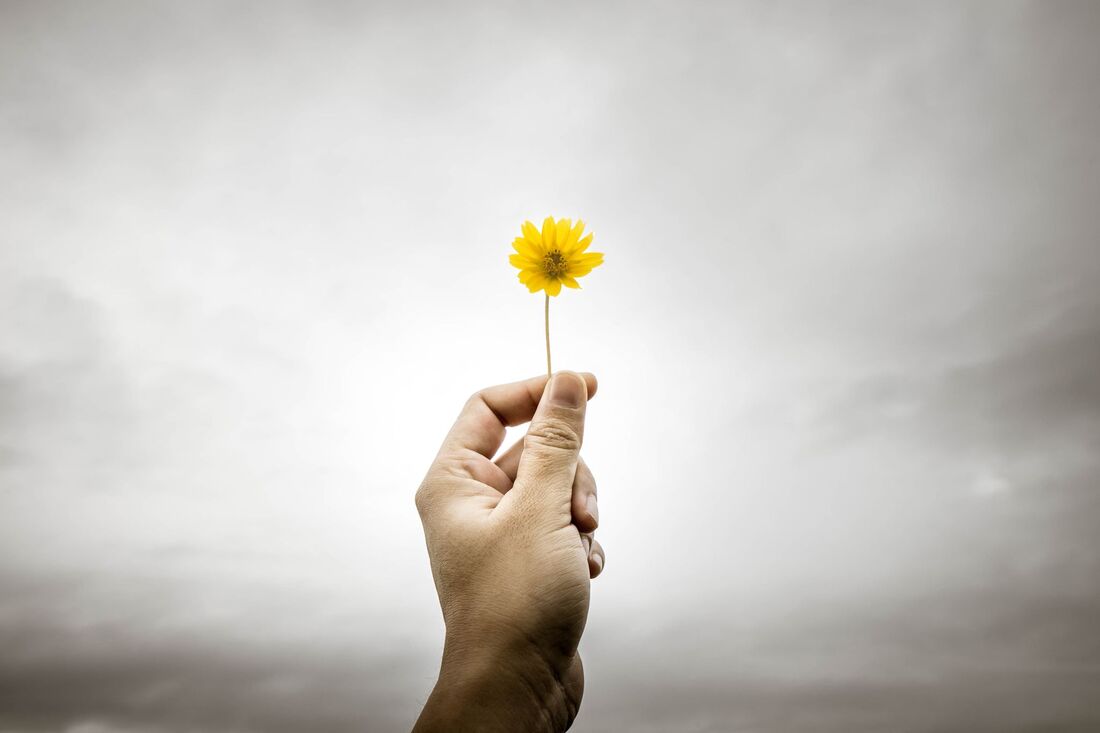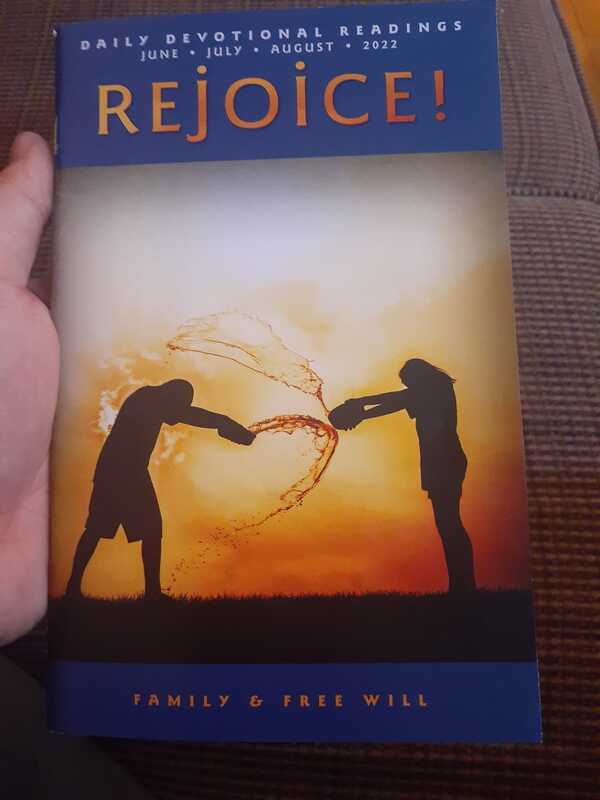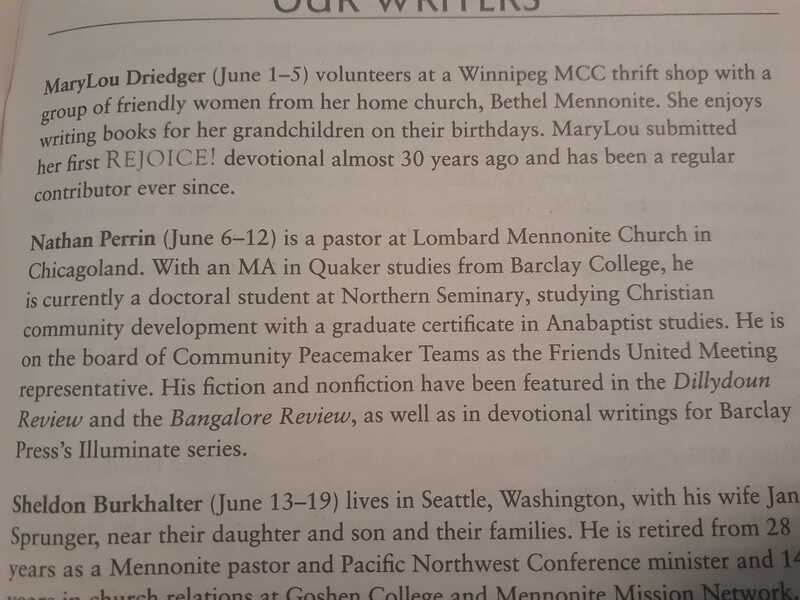 So a great opportunity opened up for me recently - I was added on as a writer for an unannounced comedy series. I can't go into more specific details than that at this stage. But I've been reflecting on what this new step means for me, and how crazy it is that I'm literally doing the things I've always wanted to do. When I was fifteen, I walked out of Inglourious Basterds thinking: "This is what I want to do with my life." Then my faith led me into ministry, and I always thought that these dreams of creativity were not to be taken seriously. When I became a pastor and hopeful theologian, I figured that was my life from then on. In fact, when my first short story was picked up unexpectedly and abruptly, I thought: "How do I let people know I have this gift, and how do I navigate this new world? And what if I fail?" One of the biggest reasons I started fleshing out my creative side more was from the advice of a comedian friend. When I shared that I don't know how to navigate this new side of myself and that I feel like I'd fail doing it, he made me stop and said: "Look, man. There are people who played it safe, and then during COVID they lost the safe job they hated. So, if you're gonna fail, fail at doing something you love. At least then you'll say you gave it a shot." So I've been closing my eyes and stabbing in the dark ever since. A huge part of my testimony involved making peace - and ultimately saying goodbye - to that kind of creativity. So my internal spiritual journey with this has been complex, because I still see myself being a minister and theologian at heart. I still believe that will express itself in whatever I do. That being said, I will be staying with my church and the Chicago area (for those wondering.) I'm very happy where I'm at. I also did not know that this opportunity would pop up because of my life experiences as a minister, student, and working around human rights circles. Even my own community development studies and training lend me here. Long story short, it let me know that God is still at work in my life in ways I don't yet recognize. More details, per usual, will be shared as things slowly become more public. I don't know how this will all add up in the future, but I'm just excited for whatever's next. I feel like a fifteen year old kid again, in a good non-angsty way with the same taste in music. That's a good place to be.
0 Comments
 When I first started this blog, I wanted it to primarily focus on my writing - albeit with some Christian spirituality. I didn't intend to start anything theological, because most of my publications have been in secular journals and most of my writer connections are not Christians. But with recent events in Ukraine and the world just being awful, the preacher in me feels compelled to speak into it. This will include some of my own theological journey to embracing a more resilient theology. I went to Iraqi Kurdistan in September 2017. Around that time, there was a referendum in the northern area of Iraq for the Kurdish people to become their own nation-state. The referendum passed with 93% approval from the Kurds, only for both the American and Iraqi government to respond by shutting the vote down and closing all the airports. Pretty soon, people I knew were being thrown in prisons and there were riots. I left two days before the referendum, but I remember watching all of this unfold and then looking around me in an otherwise peaceful environment. I felt bizarre going around in my day-to-day life trying to make sense of it all. I remember telling well-intentioned Christian friends about the injustices and oppressions I saw, only for most of those same Christians to reply: "Well, at least God will make it right some day." I don't blame any westerner for replying like that. There really is no decent, good response in the moment unless we take time to fully understand what our own role is to play. Regardless - for the child who is now an orphan and for the family that is now homeless due to war and conflict, that answer doesn't solve anything. The thing of it is that it is so easy to distance ourselves when we assume that there is nothing we can do. But the words of Jesus tell us it's our mandate to not give into despair, or inaction, because it distracts us from the things we ought to be doing. Miguel A. De La Torre in is book Embracing Hopelessness tells a story about taking some seminary students to Mexico to witness poverty and listen. One of the students told him afterwards, "When I looked into her eyes, I felt comforted by her hope." Torre looked back at her and said, "That woman is either going to be homeless or marry someone abusive just to survive day to day." He doesn't tell this story to discourage her - but to force her to see the reality of the situation. Rampant poverty and systemic injustice exists, and we can't ignore them because we sense that some day things will be right. Grief and sadness are invited into this space of seeing these very real problems exist. But the truth is that all is not yet lost. And, while I do believe God will make things right one day, I also understand I can't make my own hope toxic and ignore the Kingdom work that absolutely needs to be done. Basic to my own brief despair after Kurdistan's referendum. I found myself trying to cope with this bizarre trauma of feeling like my own world was falling apart. Then I discovered the work of Jurgen Moltmann, particularly his book Theology of Hope. This book made me look at the concept of Resurrection and social justice in a clear light. If I embrace orthodoxy and even Hope, then I must embrace the radical life that Jesus calls me to live. Moltmann writes, “That is why faith, wherever it develops into hope, causes not rest but unrest, not patience but impatience. It does not calm the unquiet heart, but is itself this unquiet heart in man. Those who hope in Christ can no longer put up with reality as it is, but begin to suffer under it, to contradict it." That's what helps me continue to hold on to hope, and that's what God invites us to today. But hope can also be toxic - inviting us to distance ourselves from the pain of others because of a vague understanding that God will make it right somehow. We may not able to control all of our circumstances, but we can do much with the little we do have if we have the resources and the willingness to understand first - and when we realize that is the space where God waits for us, there is no more empowering life we can live. George Fox in his journal writes about an instance where he witness wealthy people have a Christmas party. Then he looks down the street from the party where the beggars were. He realized God was more with them than with those ignoring the situation. We encounter those situations every day. Are we willing to listen to that of God in our neighbor? In Matthew 25: 31-40, Jesus preaches: “When the Son of Man comes in his glory, and all the angels with him, he will sit on his glorious throne. All the nations will be gathered before him, and he will separate the people one from another as a shepherd separates the sheep from the goats. He will put the sheep on his right and the goats on his left. “Then the King will say to those on his right, ‘Come, you who are blessed by my Father; take your inheritance, the kingdom prepared for you since the creation of the world. For I was hungry and you gave me something to eat, I was thirsty and you gave me something to drink, I was a stranger and you invited me in, I needed clothes and you clothed me, I was sick and you looked after me, I was in prison and you came to visit me.’ “Then the righteous will answer him, ‘Lord, when did we see you hungry and feed you, or thirsty and give you something to drink? When did we see you a stranger and invite you in, or needing clothes and clothe you? When did we see you sick or in prison and go to visit you?’ “The King will reply, ‘Truly I tell you, whatever you did for one of the least of these brothers and sisters of mine, you did for me.’" To truly embrace the other is to embrace God, and to identify with another's struggles is to understand what they are going through. It is in that space that God calls us to live. Even when that same neighbor is across an ocean, we can have the willingness to learn how our western culture impacts those issues and work on ways to fix things here. Let God bless you this week with these words, and may you cling to a healthy, non-self savior centered sense of hope.  I finally found a writer's group I can fully vibe with. They're local Chicagoland people who meet every Wednesday night, and then afterwards they usually go out to Lou Malnatti's for some late night hangout (as one does in this area.) My first meeting there, there were two poems written from the perspective of older women basically lamenting their lost younger years - meaning, they did not understand what they had at the time. I've been thinking deeply about what they had to share. I was very grateful to hear what they had to say, and it made me pause and wonder if I was taking my own years for granted. I've never really bought into the idea embedded in more conservative forms of evangelicalism that your younger years should be centered on finding a spouse and finding a way to settle down. I've also never bought into the idea that you should spend your time living it up (or YOLOing, as the hip millennials would say.) I think, really, the point of any life is to find that we are loved and created with intention by a God who wants to be there for us. I have a Raymond Carver poem as my wallpaper on my computer desktop. It's called "Late Fragment." It reads: "And did you get what you wanted from this life, even so? I did. And what did you want? To call myself beloved, to feel myself beloved on the earth." (source) He wrote that as one of his final poems as he was facing a cancer diagnosis, and he was filled a sense of thankfulness for his life. It's from that perspective that I honestly say that I don't believe in wasted years, or even wasted time (as far as our experiences are concerned.) I think ultimately, in some mysterious way, when we position ourselves to receive what life throws at us with open hands, anything can become a sort-of lived grace. A common Rabbinic Jewish teaching is to use everything in our lives as teaching tools, including our mistakes or things we consider wasted. When we do this, we realize life is about owning our mistakes and attempting to move forward. It's about learning to love God and our neighbors. It's about paying attention to what God is communicating to us day in and day out. Frederick Buechner once wrote, "Listen to your life. See it for the fathomless mystery it is. In the boredom and pain of it, no less than in the excitement and gladness: touch, taste, smell your way to the holy and hidden heart of it, because in the last analysis all moments are key moments, and life itself is grace.” (From Now and Then: A Memoir of Vocation) I think we've been sold a bill of goods whenever there's an idea set before us of what an ideal life looks like. God is no less present in the world of a Walmart cashier than He is in the world of an entrepreneur. When can call ourselves beloved, in both the specific and broad senses of the term, we free ourselves to see how God works in our own worlds. And, more importantly, we reflect that gift to other people. That's ultimately what makes life all the more richer: connection. It is being beloved that we can enjoy life, and it is through viewing others as beloved that we can sense God too. I don't know how I'll feel about this philosophy as I get older, but I figure anything that sticks close to what Jesus would teach is a pretty safe bet. I'm a huge fan of His, anyways. Hey friends!
I'm excited to announce I have been published in Rejoice! Magazine for the summer. Pick up a copy if my usual edgy lit journal stuff isn't your thing. Devotional writings are another joy for me, so I enjoyed working on this project. You can order a copy here: https://www.mennomedia.org/9781513810263/rejoice/ Hope you all have a blessed and wonderful weekend! |


 RSS Feed
RSS Feed
